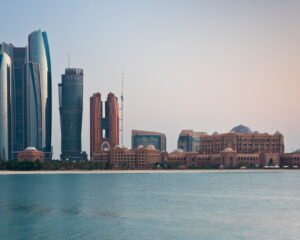A Comparative Look at Property Investment: Dubai vs. Prague
For Czech investors thinking about where to put their money, Prague and Dubai could hardly be more different. Dubai is new, fast, and full of high-rise developments and luxury projects. Prague is older, steadier, and built on history, with a pace that feels far less rushed.
These investment markets play by different market rules, offer different kinds of returns, and carry different levels of risk. Both can make sense as an investment, but the better choice depends on what you’re looking for, how much risk you’re willing to take, and how hands-on you want to be. In the next sections, we’ll look at the main factors side by side so you can decide whether your next property belongs here at home in Prague or in the faster-moving world of Dubai.
Table of Contents
1. Market Trends: Steady Climb at Home vs. Rapid Growth Abroad
Prague
Prague’s property market isn’t flashy, but that’s exactly why so many locals trust it. Over the past five years, prices have climbed about 25%. Sure, that’s nothing like the jumps you see in Dubai, but it also means you’re not waking up to wild swings in value. Even when prices dipped a bit in 2023, they were back up the following year (climbing between 8.4% and 10.7% in 2024).
In the city center, places like Prague 1 and 2 still command big prices, mostly because of their history and prestige. But if you’re looking for something with more growth potential, Prague 9 has been attracting buyers who want value now and upside later. It’s the kind of market you can park your money in and not have to check every week.
Dubai
Dubai is a whole different beast. Since 2019, property values have shot up a staggering 147%. Just in the third quarter of 2024, the city logged AED 120 billion in sales, a 30% jump from the year before. Areas like Downtown Dubai, Palm Jumeirah, and Business Bay are constantly in the headlines and in investors’ sights. This accelerated pace for return is a big part of Dubai’s appeal. The market moves fast, and so can your outcomes. Dubai offers investors a proven track record of strong demand and liquidity, with the potential for attractive returns over comparatively short holding periods.
2. Buying Rules & Ownership Rights
Prague
Prague is straightforward, just not speedy. You can buy anywhere in the city with no special zones, but expect a fairly procedural path: paperwork, a few appointments, and timelines that follow the Land Registry’s pace Costs like notary work, registration, agent fees, and a required valuation (if you’re taking a mortgage) can stack up, and banks tend to underwrite conservatively, which can stretch closing a bit.
Tenant protections are strong, which is great for stability, but can make turnover slower and yield management less flexible. Foreign buyers have the same ownership rights as locals, but overall, it’s a measured process—more box-ticking and a longer wait from offer to first rent.
Dubai
Dubai allows foreigners to purchase freehold property in a wide range of designated areas across the city, including well-known hubs such as Dubai Marina, Palm Jumeirah, and Business Bay. These zones are not confined to just a handful of districts—freehold options are spread throughout Dubai and continue to expand as the city develops. In areas outside the designated freehold zones, buyers can still secure long-term leasehold rights of up to 99 years, offering plenty of flexibility for different investment strategies.
One of Dubai’s big draws is how fast transactions move. Many go from offer to handover in just a few weeks, so rent can start sooner, and your capital isn’t sitting idle. With plenty of established neighborhoods and new ones on the rise, choosing the right area can set you up for strong resale potential and long-term growth.
3. Costs & Fees
Prague
For Prague investors, the costs are straightforward and easy to plan for:
- Notary fee: CZK 2,000–5,000
- Agent’s commission: 2–7% of the sale price
- Mortgage registration: around CZK 2,000–5,000
- Land Registry/title registration: 2,000 CZK in person or 1,600 CZK online (fixed filing fee)
- Property valuation (if you’re taking a mortgage): typically, costs range between 3,000 – 6,500 CZK (for an apartment, 3,000 – 5,000 CZK, while for a family house and land, 4,500 – 6,500 CZK)
Payments usually go through a lawyer, notary, or bank escrow and are completed by bank transfer. It can take a bit longer, but the steps are straightforward.
Dubai
When considering the costs for property investing in Dubai, the list looks similar at first glance:
- DLD: 4% transfer fee
- Title Deed Fee
• Secondary market: AED 580 per transaction
• Off-plan: part of the 4% DLD transfer fee, no separate fee - Admin Fee for Off-Plan: AED 1,100–5,000 (developer-set)
- Trustee Fee
• Secondary: AED 4,250
• Off-plan: no trustee fee is needed when buying off-plan - Agent’s Commission (secondary): 2 % of the sale price + 5 % VAT, paid by the buyer.
- Mortgage fees: 0.25% of loan + AED 290
- Land Registry / Registration fee (Title Registration): AED 2,000 (properties < AED 500,000) or AED 4,000 (≥ AED 500,000), plus VAT.
- Property valuation fee (for mortgage financing): typically AED 2,500–3,500 (+ 5% VAT).
- Ongoing municipal charge: Dubai Municipality housing fee equal to 5% of the property’s annual rental value, billed monthly via DEWA (applies to tenants and is assessed for owner-occupiers based on market rent)
The convenience is that you can pay a lot of this with a credit card, even from overseas. The catch? Once you add it all up, Dubai’s extras can make the total cost noticeably higher than investing in Prague.
4. Financing: Conservative at Home vs. Generous Abroad
Prague
Banks in Prague keep things tidy. According to the Czech National Bank (CNB), most buyers can borrow 60 – 70% of the property’s value, with rates now around 4 – 5%. That means you’ll need to put more cash in up front, but it also keeps your borrowing at a sensible level. For risk-conscious buyers, this can be reassuring because it limits debt and keeps your monthly payments manageable, even if the market cools.
Dubai
Dubai is more generous, letting foreigners borrow up to 80% of the property’s value. Rates are usually 2.5–3.5% above EIBOR, and pre-approvals are quick, often valid for 60 days. While higher borrowing power naturally magnifies both gains and losses, investors who structure their financing wisely can take advantage of this flexibility without undue risk, even if the market experiences short-term fluctuations.
5. Rental Income Potential
Prague
Yields here average about 3.3%. It’s not going to make you rich overnight, but long-term rentals are rarely empty thanks to demand from professionals, students, and expats. Short-term rentals are heavily regulated, which limits upside but keeps things stable.
For investors who like predictable income and low vacancy rates, this is a market you don’t have to babysit.
Dubai
Dubai averages around 6.9% in gross yields, with some districts even higher. The city’s expat-heavy population and strong tourism keep both long- and short-term rentals in demand.
But the income can be seasonal and sensitive to global events. Tourism dips, regulatory changes, or a surge of new properties on the market can cut yields. However, with sensible pricing and professional management, the higher yield potential typically outweighs those swings, especially if you’re comfortable adjusting rates and lease terms to match demand.
6. Residency Perks
Prague
For Czech citizens, residency isn’t something you need to think about when buying at home. For foreign buyers, owning a property here doesn’t automatically grant the right to live in the country, but it can strengthen certain visa or residency applications. It’s a nice supporting factor, just not a guaranteed path.
Dubai
A big attraction for many overseas buyers in Dubai is the Golden Visa. Buy a qualifying property worth at least AED 2 million, and you can apply for a 10-year residency that also covers your close family. It’s a tempting perk, but the rules aren’t set in stone, and if your property’s value drops below the limit, keeping that visa could become a problem. Read our guide on Gold vs Standard visa when buying a property in Dubai to find out more details.
7. Lifestyle: Familiar Comfort vs. Fast-Paced Luxury
Prague
If you are a local investor, owning in Prague means you’re close to your property, you know the market, and you can handle repairs or tenant changes without crossing borders. The pace here is slower, the culture is familiar, and the market moves in a way you can read without having to check the news every morning. It’s ideal for investors who want their property to work for them, not turn into a second job.
For foreign buyers, Prague has a lot going for it. The rules are clear, the process is straightforward, and unlike in many other European capitals, there are no limits on where you can buy. Even if you’re managing things from another country, the combination of a stable market, steady demand, and reliable rental income makes it surprisingly easy to keep everything running smoothly from afar.
Dubai
Dubai is built for people who invest and get on with their lives. Leases turn over quickly, most buildings are new or recently upgraded, and tenants expect gyms, pools, parking, and decent on-site service – easy boxes to tick with the right building and price point.
Paperwork is mostly digital (tenancy registration, utility setup, payments), so managing from another country isn’t a headache. With a large flow of newcomers and tourists, well-priced homes in the right communities don’t sit empty for long.
Yes, the market moves fast. However, a property management agency like Czechin can take the moving parts off your plate: smart pricing and calendar management, multi-channel listings, guest screening, housekeeping, and maintenance.
Bottom line: Prague suits hands-off stability. Dubai suits investors who want a responsive market, modern stock, and systems that make remote ownership practical.
Choosing the Right Market for Your Next Move
If you want steady returns without too many surprises, Prague is the safer long-term choice. It’s a market that moves at a measured, yet impressive pace, and rewards patience. Dubai can deliver bigger rental returns and faster growth in a short period, but it’s not a sure win. Prices can change direction quickly, certain location rules can narrow your choices, and when the right deal comes along, you have to be ready to move fast.
In the end, it comes down to how you like to invest and how much uncertainty you’re willing to take on. If you’re unsure which market is the better fit, the Czechin team can help. We work with clients in both Prague and Dubai, from the first market review to signing the deal, and offer a curated selection of investment properties in Dubai to guide your choice. Contact us today, and let’s find the property that matches your goals.






